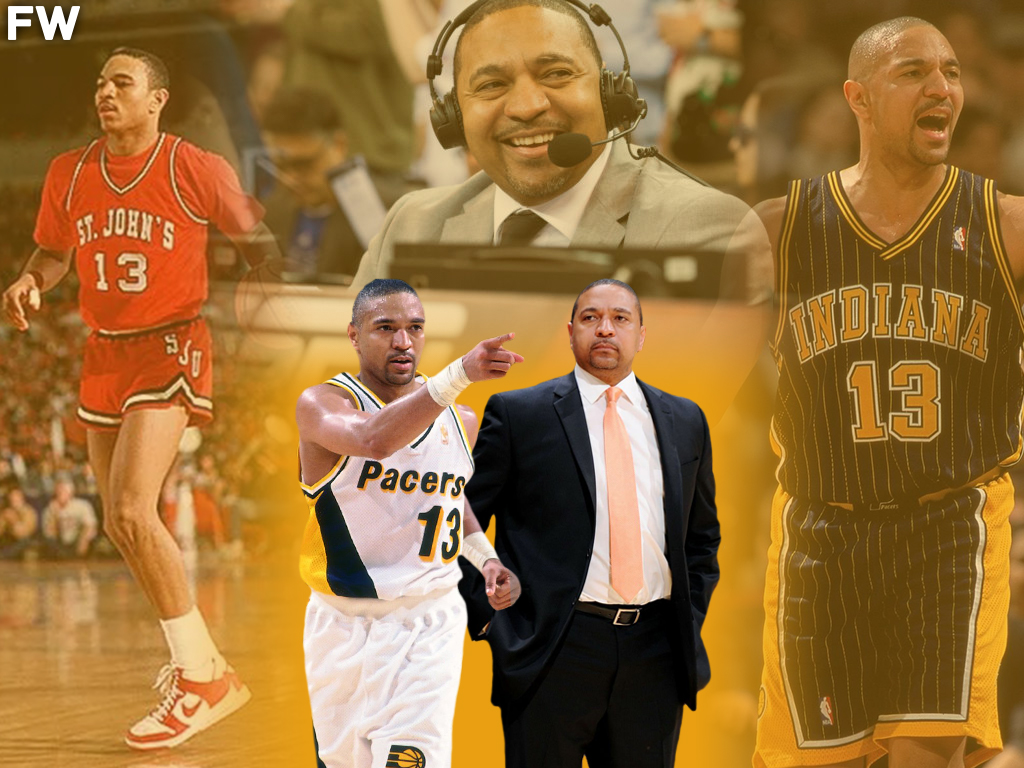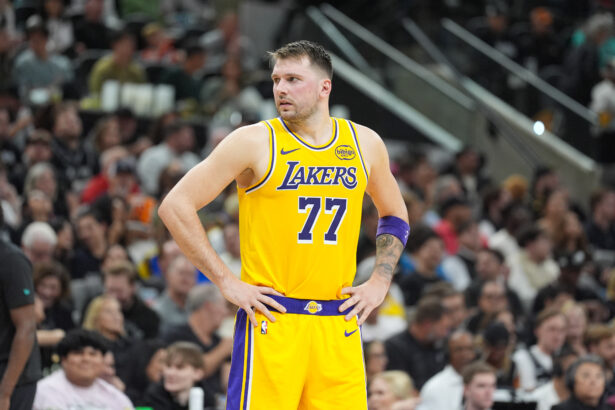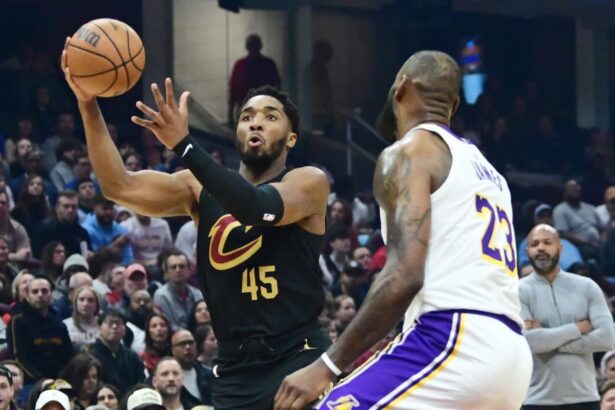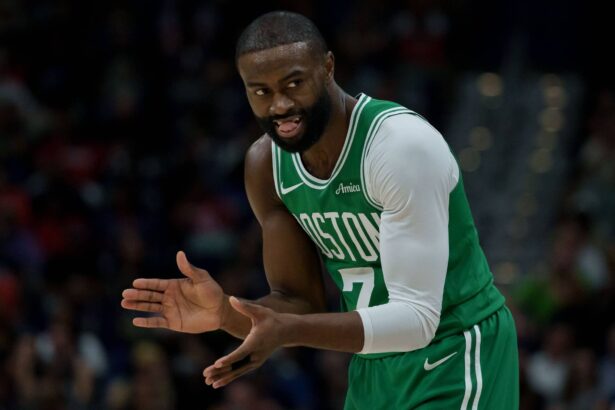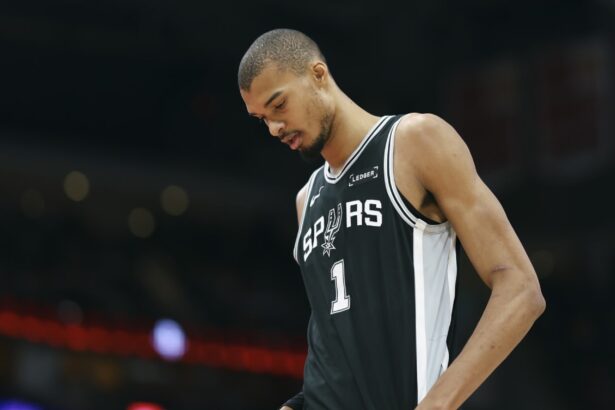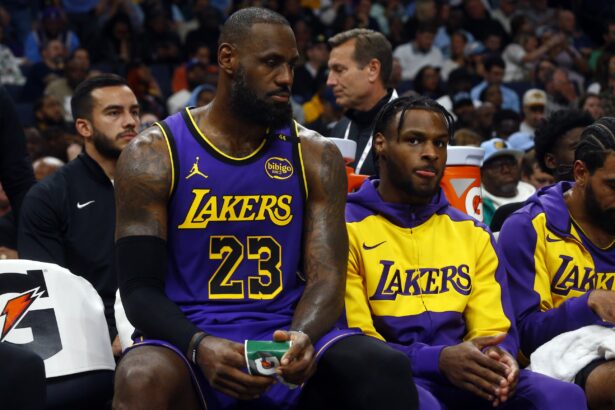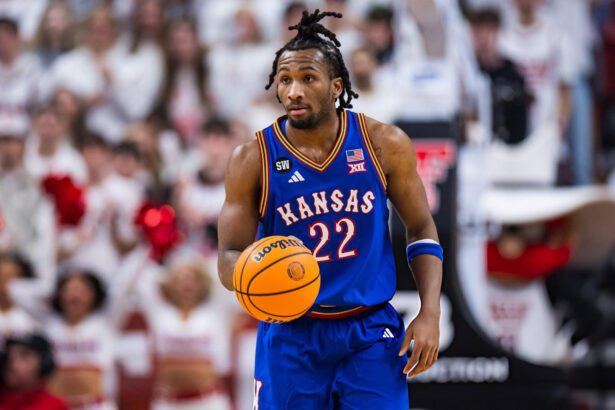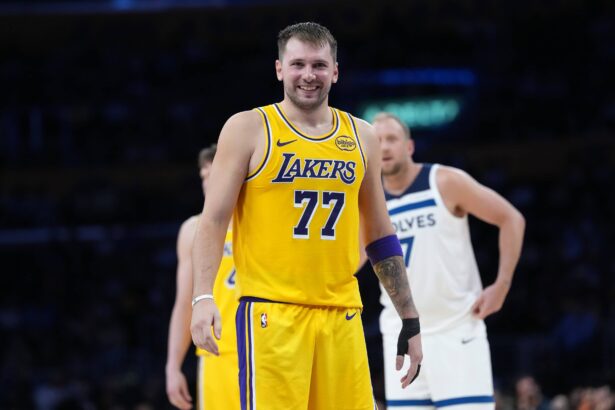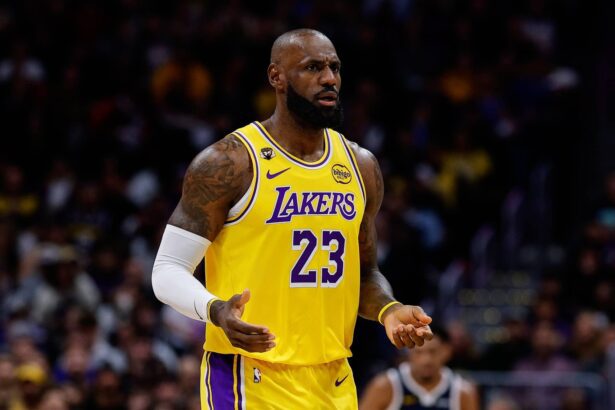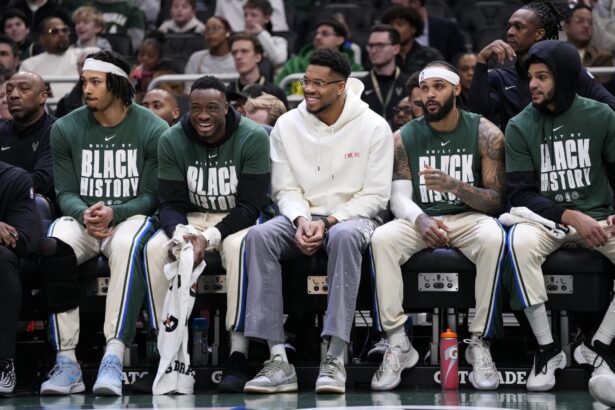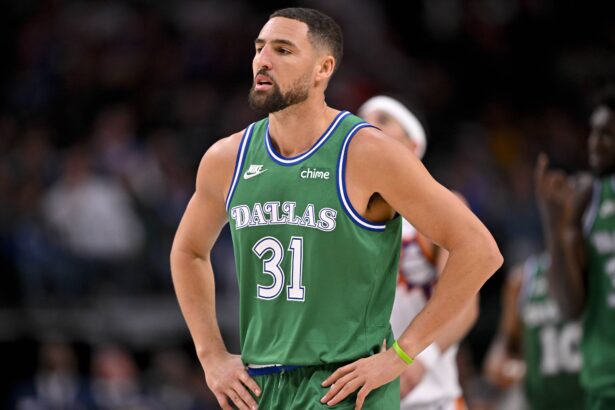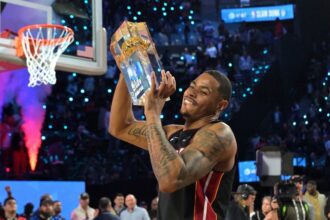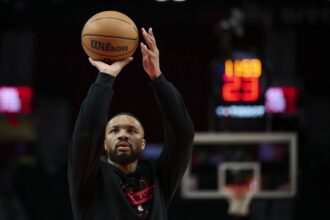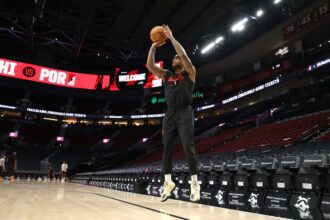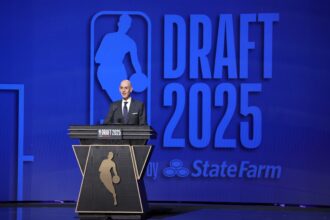One of the most entertaining announcers for NBA games right now has to be Mark Jackson. With his insights into the game, his chemistry with Jeff Van Gundy, and of course, his catchphrase: “with all due respect”, Jackson has become a fan favorite to listen to.
- Mark Jackson’s Early Years
- Jackson’s College Years And His Rookie Of The Year Campaign In The NBA
- Jackson Finds Success In Indiana
- A Finals Trip And A Return To New York For Mark Jackson
- Retirement And The Start Of A New Career
- Jackson Becomes A Successful NBA Announcer And Head Coach
- Next
- 20 Supertalented High School Prospects Who Could Become NBA Stars
- 1990-91 All-NBA Teams: Michael Jordan, Magic Johnson And Charles Barkley Led An Incredible First Team
- Jason Kidd’s Journey: Drafted By The Mavericks, Won The Championship With The Mavericks And Became The Head Coach of The Mavericks
- 1976 NBA Finals Epic Finish: Boston Celtics vs. Phoenix Suns Game 5 Triple-Overtime Thriller
- The Celtics And Warriors Superteam vs. Rest Of The League: Can Stephen Curry And Jayson Tatum Defeat LeBron James And Kevin Durant?
Before Jackson became an announcer for ESPN, working on NBA games, he was an NBA player. Jackson played 17 years in the league for seven teams. He was most known for his years with the Indiana Pacers and the New York Knicks.
Mark Jackson’s Early Years
Mark Jackson was born in Brooklyn, New York, and grew up in the St. Albans neighborhood of Queens, New York. Jackson attended Bishop Loughlin Memorial High School in Brooklyn, where he became one of the best point guards in the nation.
Jackson was also known as a popular streetballer in New York. This gained him fame and attention from colleges. Jackson would go on to attend St. John’s University.
Jackson’s College Years And His Rookie Of The Year Campaign In The NBA
Mark Jackson played four years at St. John’s University, averaging 10.1 points and 5.6 assists per game. These averages weren’t anything special, but Jackson’s play was still good enough to attract NBA teams.
Jackson would be selected by the New York Knicks in the first round with the 18th pick. This was fitting for Jackson, since he was from New York.
Jackson would team up with Patrick Ewing on the Knicks, and he had immediate success. The Knicks only finished with a 38-44 record, but Jackson won the Rookie of the Year Award with averages of 13.6 points, 10.6 assists, 4.8 rebounds, and 2.5 steals per game.
By Jackson’s second year, the Knicks improved their record to 52-30, which was good enough to win the Atlantic Division. Jackson’s points average would go up in his second year to 16.9, but his assists (8.6), rebounds (4.7), and steals (1.9) averages would all drop.
The second season for Jackson would be the only time he was named to the All-Star team. Jackson came off the bench to play 16 minutes, and he scored 9 points on 3-5 shooting, and he handed out 4 assists. Jackson’s Eastern Conference team lost 143-134 to the Western Conference.
The Knicks would enter the playoffs as the second seed, and they’d advance to the Semifinals, where they’d lose 4-2 to Michael Jordan’s Chicago Bulls. Jackson played well, averaging 14.5 points and 10.5 assists. He also taunted the great Michael Jordan at one point during a game.
Jackson would play for the Knicks until the 1992-93 season when he was traded to the Los Angeles Clippers. After two seasons in LA, where Jackson helped the Clippers make the playoffs in the 1992-93 season, Jackson was traded once again, this time to the Indiana Pacers.
Jackson Finds Success In Indiana
Mark Jackson joined the likes of Reggie Miller and Rik Smits in the 1994-95 season, and Jackson was a natural fit for the Pacers.
In his first season with the Pacers, Jackson helped lead Indiana to a 52-30 record, the best in their franchise at that time. The Pacers won the Central Division, and they secured the second seed in the East.
The Pacers would face Jackson’s old team, the New York Knicks, in the Semifinals, and they’d go on to win the series in seven games. Jackson’s Pacers would eventually fall in seven games to the Orlando Magic in the Eastern Conference Finals.
The following season, Jackson helped the Pacers win 52 games but would fall in the first round against the Atlanta Hawks. Star guard Reggie Miller missed the last few games of the regular season and the first four games of the playoffs with an eye injury.
This disappointment in the playoffs for the Pacers likely led to the shocking trade of Jackson to the Denver Nuggets for third-year guard Jalen Rose.
Pacers president Donnie Walsh had this to say about trading Jackson to the Denver Nuggets:
“We made this trade in order to improve our draft position, get more flexible, and to get younger. It was difficult to trade Mark and Ricky because of the contributions they made to our franchise. We got a very flexible young player in Jalen Rose and a fine shooter in Reggie Williams.”
The Pacers experiment of going younger didn’t work out so well. The team struggled mightily, as they were below .500 for the entire season.
Jackson’s new squad, the Denver Nuggets, also were struggling, being well below .500. But Jackson personally was having maybe the best season of his career.
Jackson was leading the league in assists with 12.3 per game while playing for the struggling Nuggets. Then, Jackson got the surprise of his life.
As the trade deadline was winding down, the Pacers made a bold move and traded to get Jackson back. Jackson, who was now an Indiana Pacer, had this to say about getting the call to return to Indiana:
“This was shocking to me to some degree. I didn’t know where I would wind up or who was calling.”
Jackson went on to add:
“This team [Pacers] is in the middle of a playoff race, trying to put ourselves in a position. And these guys know me. They know what to expect. I think it’s a perfect situation.”
The Pacers would end up missing the playoffs even with Jackson back on the team, as they finished with a 39-43 record. Jackson would go on to lead the league in assists with 11.4 per game. This was the only time in Jackson’s career that he led the league in assists.
The following season, the Pacers would perform much better, finishing with a 58-24 record. Jackson averaged 8.3 points and 8.7 assists per game.
The Pacers reached the Eastern Conference Finals for the second time, with Jackson as their point guard. This time, they’d run into Michael Jordan’s Chicago Bulls dynasty and lose in an epic seven-game series.
Jackson’s Pacers would reach the Eastern Conference Finals in the next two seasons; both times, they’d face Jackson’s original team, the New York Knicks. The Pacers would lose 4-2 in the 1999 playoffs, but they’d turn around and win 4-2 in the 2000 playoffs.
A Finals Trip And A Return To New York For Mark Jackson
After the Pacers defeated the New York Knicks 4-2 in the Eastern Conference Finals, the Pacers met up against the Shaquille O’Neal and Kobe Bryant-led Los Angeles Lakers.
Despite giving a good effort, the Pacers would fall 4-2 to the Lakers. Jackson averaged 9.7 points, 7.7 assists, and 5.3 rebounds per game.
Jackson’s numbers may not have been the greatest in the Finals, but he did make “the shot of the Finals” with his three from half court to beat the first-quarter buzzer in Game 6:
After the 1999-2000 season, Jackson decided to leave the Pacers and signed with the Toronto Raptors as a free agent. This didn’t last long, only 54 games, before the Raptors traded Jackson to the New York Knicks.
Jackson was back where his NBA career started, in New York as a Knick. He’d finish the season with the Knicks, helping them reach the playoffs as the fourth seed with a 48-34 record.
The Knicks would lose 3-2 to the Raptors in the first round. The following season, the Knicks would struggle to a 30-52 record, and the Knicks would miss the playoffs for the first time in 15 years.
Retirement And The Start Of A New Career
After the New York Knicks missed the playoffs in the 2001–02 season, Jackson was traded to the Denver Nuggets, but they immediately waived him. Jackson would play two more seasons, one with the Utah Jazz and his final season with the Houston Rockets.
Mark Jackson retired from the NBA after the 2003-04 season. He finished with career averages of 9.6 points, 8.0 assists, and 3.8 rebounds per game.
Jackson finished with 10,334 career assists, which is 5th all-time. He also is credited for having the league start the rule for the five-second back-to-the-basket violation.
This was in response to Jackson’s patent move of backing down a smaller guard for 15 seconds or longer.
With Jackson’s playing career over, he’d look to start a new career. This career would involve basketball, but he wouldn’t be playing. Instead, he’d be calling the games.
Jackson Becomes A Successful NBA Announcer And Head Coach
Jackson joined the NBA on ESPN and ABC as a game commentator in 2006. He also worked on NBA Saturday Primetime on ABC, as well as NBA Finals games.
Jackson became a fan favorite to listen to, especially with his “with all due respect”, and “mama there goes that man!” catchphrases. The former has since become an internet meme:
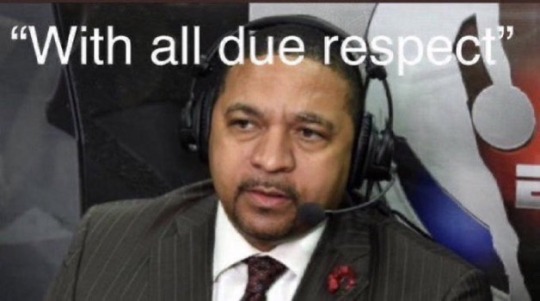
Jackson would continue with his NBA commentator job until 2011, when he stepped down to take on a new position: Head Coach for the Golden State Warriors.
Jackson had the honor of coaching a young Stephen Curry and a young Klay Thompson. The Warriors’ success that they’ve had under head coach Steve Kerr can be attributed back to Jackson.
In an interview with ESPN’s Marc J. Spears, Kerr said Jackson made the Warriors a “great defensive team” prior to his arrival.
Warriors coach Steve Kerr credits former Warriors coach @MarkJackson13 for making the franchise a "great defensive team" before his arrival.
— Marc J. Spears (@MarcJSpears) June 6, 2017
Jackson coached the Warriors for until the 2013-14 season. He led the Warriors to back-to-back playoff berths (2013, 2014). This was the first time the Warriors reached the playoffs in consecutive years since 1992.
Jackson finished with three years as head coach in Golden State with a 121-109 record. Despite changing the culture in Golden State, the Warriors’ ownership didn’t believe Jackson could take the Dubs to the next level, but this wasn’t it.
According to an article written for SB Nation by Jesus Gomez, Joe Lacob, owner of the Warriors, had this to say about Jackson’s firing:
“Part of it was that he couldn’t get along with anybody else in the organization. And look, he did a great job, and I’ll always compliment him in many respects, but you can’t have 200 people in the organization, not like you.”
After being fired as head coach of the Warriors, Jackson returned to ESPN/ABC to broadcast games. The broadcast team of Mark Jackson, Jeff Van Gundy, and Mike Bream is great to listen to.
But as NBA fans, we’d love to see Mark Jackson back as an NBA coach. With all due respect, he’s earned it.

